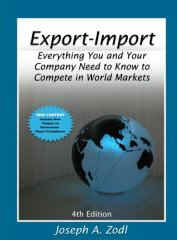
Marketing Across the Cultural Barrier
by
Joseph Zodl
© 2000 Joseph Zodl
(excerpted from remarks at Breakfast Series, sponsored by Scottsdale Community College,,
Scottsdale, Arizona, September 28, 2000)
A factor that many Americans find difficult to transcend in international marketing is that of the cultural barriers. This holds true for buyers of import products, too, but it is infinitely more important for the seller because the seller has the critical need of pleasing the buyer.
The most critical barriers are those such as religious and political differences. It's best to get an overview of the differences to avoid making an accidental mistake, and of course the good salesman never gets into an improper discussion of the buyer's religion or politics anyway.
Beyond this, there are barriers such as literacy (some consumers may have difficulty reading a label in their own language or an instruction booklet), measurement (foreign consumers buying a product do not want to buy a non-metric set of tools to work on the product, or would have no interest in buying a liquid product by the quart instead of by the liter), or a language mistake even in English (a car in the United Kingdom has a bonnet and a boot instead of a hood and a trunk).
The keys to overcoming the cultural barriers are, first, to be aware of them. them in communicating with your foreign distributor (and remember to avoid the use of the word agent). Let the distributor examine the product thoroughly as well as all sales literature, and make the suggestions as to how the product or literature may need to be revised to be successful in his marketplace. Regardless of the relationship, you and the foreign distributor are partners in that you both want the venture to be successful.
Some possible differences that may have to be taken into consideration, all cultural, some involving legalities as well:
Language differences (and remember that French in Paris is different from French in Montreal).
Literacy (some consumers may need to see a picture on the outside of canned food to understand what the contents are).
Measurement (metric).
Meanings (a product with the word Royal in it will have difficulty entering the United Kingdom without designation by Queen Elizabeth).
Religious (a beef product is difficult to market in India).
In studying for my M.B.A., one of the most interesting courses I took was dedicated to cross-cultural barriers. In the entire semester, we just scratched surface of differences. Focusing on one country at a time, it is easier to discover the most important differences in a short period of time. The next step is to work closely with the foreign distributor to ensure that you will be handling the barriers correctly in establishing your market share.
 |
||